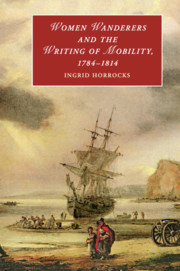Crossref Citations
This Book has been
cited by the following publications. This list is generated based on data provided by Crossref.
2017.
Women Wanderers and the Writing of Mobility, 1784–1814.
p.
289.
2017.
Urbanization and English Romantic Poetry.
Bredar, Trish
2019.
Wild Wanderings: Gender and Pedestrian Travel in Charlotte Smith's Elegiac Sonnets.
European Romantic Review,
Vol. 30,
Issue. 2,
p.
149.
Branagh-Miscampbell, Maxine
Leonardi, Barbara
Greig, Elias
Falk, Michael
and
Kiek, Miranda
2019.
XII Literature 1780–1830: The Romantic Period.
The Year's Work in English Studies,
Vol. 98,
Issue. 1,
p.
620.
Piipponen, Maarit
Mäntymäki, Helen
and
Rodi-Risberg, Marinella
2020.
Transnational Crime Fiction.
p.
1.
Goldberg, Brian
2020.
Charlotte Smith, William Hayley, and Discriminated Anguish.
The Wordsworth Circle,
Vol. 51,
Issue. 3,
p.
360.
Johnson, Nancy E.
and
Keen, Paul
2020.
Mary Wollstonecraft in Context.
2020.
Print and Performance in the 1820s.
p.
265.
McInnes, Andrew
2020.
Mary Wollstonecraft in Context.
p.
11.
Bhattacharya, Diti
and
Barry, Kaya
2021.
On orientations and adjustments: an exploration of walking, wandering and wayfinding in Brisbane – Meanjin, Australia.
Australian Geographer,
Vol. 52,
Issue. 3,
p.
257.
2021.
William Wordsworth, Second-Generation Romantic.
p.
273.
2021.
Art, Science, and the Body in Early Romanticism.
p.
254.
Wu, Juanjuan
2021.
“A Broken Journey”: Emotions, Race, and Gendered Mobility in Mary Gaunt’s Narratives of China.
Women's Studies,
Vol. 50,
Issue. 7,
p.
727.
Mewhinney, Matthew
2022.
Form and Feeling in Japanese Literati Culture.
p.
77.
Davis, Cynthia
and
Mitchell, Verner D.
2022.
African American Literature in Transition, 1930–1940.
p.
296.
McGinnis, April
2022.
Material Agency and the “Cluttered” Environment in Dorothy Wordsworth’s Travel Narratives.
European Romantic Review,
Vol. 33,
Issue. 3,
p.
411.
Kirkley, Laura
2022.
Across disciplines, languages, and nations: Recent scholarship on Mary Wollstonecraft.
Literature Compass,
Vol. 19,
Issue. 10,
Dow, Gillian
2023.
The Cambridge History of European Romantic Literature.
p.
319.
Dinter, Sandra
and
Schäfer-Althaus, Sarah
2023.
Medicine and Mobility in Nineteenth-Century British Literature, History, and Culture.
p.
1.
Anderson, Natasha
2023.
Medicine and Mobility in Nineteenth-Century British Literature, History, and Culture.
p.
75.



